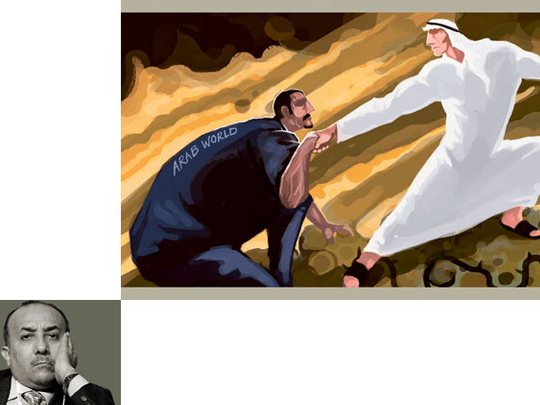
It is abundantly clear that the Gulf Cooperation Council states have provided a pivot for politics in the Arab world. The GCC has emerged as the engine and the unrivalled leader of the Arabs.
It is ironic that the GCC, an alliance of necessity and convenience formed in 1981 as a sub-Arab world organisation, stayed for too long at the periphery of Arab politics and influence. Today, it is the undisputed leader of the Arab world. Even the sweeping change of the Arab Spring catapulted the GCC into playing a leading role and helped it to steal the show from traditional powerhouses like Egypt, Iraq and Syria, which are all at critical junctures, embroiled in their own revolutions, bloodletting, feuding and the fear of foreign intervention. The GCC put out the fires in Bahrain and Oman, and negotiated an agreement in Yemen. It rubbed shoulders with Nato in Libya. GCC states have led the Arab League and UN Security Council efforts to stop the mayhem in Syria.
Even before the outbreak of the Arab Spring over a year ago, the Arab world seemed to be a body without a head. The marginalisation of Arabs was evident from the interference of non-Arab regional powers, who ran the show and dictated the tempo. Israel, Iran and Turkey meddled in Arab Affairs, undermining our national security and relegating us to being mere spectators. In the Byzantine world of Arab politics, the largest Arab country — Egypt — did the bidding for Israel. Since the Camp David accord over three decades ago, Egypt was sidelined and at best was a mediator between Israelis and Palestinians or between the Palestinians rivals, Fatah and Hamas. Even that role was upstaged recently by tiny Qatar, when both Fatah and Hamas struck a compromise and reached a deal not in Cairo or Amman, but in Doha. Clearly the GCC states are punching above their weight.
GCC states' population accounts for a mere eight per cent of the total Arab population. But these states make up the biggest chunk of Arab GDP and wealth. Millions of Arabs are employed in the Gulf; the GCC is improving the lives of millions of Arabs by funding development and infrastructure projects through Kuwaiti, Saudi, Emirati and Qatari Arab economic funds, soft loans and grants. The soft power of the GCC states was put to good use for the benefit not only of its citizens, but also of tens of millions of Arabs.
The tumultuous and uncertain politics of the Arab Spring sweeping many countries have reached the GCC states. But almost all GCC states were able to handle the challenges and emerge unscathed, except Bahrain due to its peculiar politics, interference by Iran and the rejection of dialogue by the opposition.
Strong alliance
It is clear that the challenges facing the GCC states convinced their leaders that business as usual was no longer sustainable and an evolutionary transformation was needed to tackle the problems. Soft power alone, which has been the hallmark of the GCC, won't work anymore. The GCC needs to be an alliance with more teeth and muscle. This sentiment was echoed in the Kuwaiti parliament last week when the deputy speaker called for a bold confederacy of GCC states so as to be better prepared to deal with the political uncertainty. It is evident that from the GCC's perspective, Iraq is drowning in its fractious politics and bickering. The Syrian regime has unleashed a bloodbath, committing war crimes in order to crush a determined uprising. The differences between Iran and the GCC are widening, resulting in strategic brinkmanship. Syria has emerged as the faultline with the two sides engaging in a tug of war. Iran is throwing its weight behind keeping its strategic ally afloat even if it has to step all over its principle of being the inspirational power for Arab revolutions. Iran's stance has eroded the remnants of its credibility in Arab eyes. The Iranian stance is undermined by a determined GCC stance to hold the Syrian regime accountable for the crimes its army and thugs are committing against innocent civilians, recalling their ambassadors and kicking out Syria's envoys from GCC capitals. They may even go a step further by recognising the Syrian National Council.
It is clear that the GCC states have blended their soft power, wealth, media influence and undertaken bold initiatives to deal with the host of challenges and changes in a new Middle East, where the forces of realignment are at work. The GCC has its task cut out at this critical juncture in Arab history. It must meet these challenges and work on its unity with visionary outlook. If that happens, finally the GCC will succeed in creating a balance of power with the new Iraq and an emboldened, hegemonic Iran. Even if it means exacerbating the cold war between US and Iran. UK Foreign Secretary William Hague has warned that Iran's nuclear ambitions could plunge the Middle East into ‘a new Cold War'. The challenges are real, the means are there — what we need is determination to survive in order to be equal and to lead in the precarious Gulf region.
Professor Abdullah Al Shayji is the Chairman of the Political Science Department, Kuwait University. You can follow him on Twitter at www.twitter.com/docshayji









